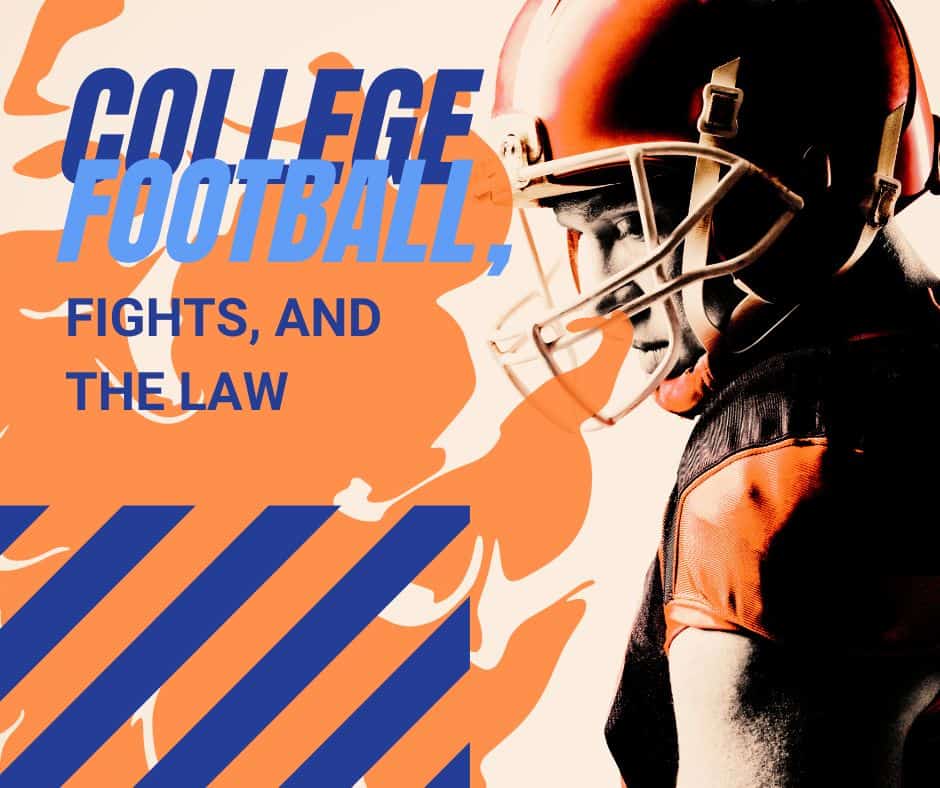Gator game days in Gainesville are legendary. Between the electric atmosphere in The Swamp, tailgates that start before sunrise, and the sea of orange and blue stretching for blocks, it’s one of the best college football experiences in the country. But while the energy is high, so is the risk of things getting out of hand.
All it takes is one heated argument, one too many drinks, or one moment of poor judgment, and suddenly, you’re not cheering in the stands but sitting in the back of a squad car.
Whether you’re a University of Florida student, a visiting fan, or just someone enjoying the game-day buzz, here’s what you need to know about disorderly conduct, resisting arrest, and when a seemingly minor incident can turn into something much more serious.
What Is Disorderly Conduct?
In Florida, disorderly conduct, sometimes called “breach of the peace,” is a second-degree misdemeanor, punishable by up to 60 days in jail and a $500 fine. But more often than not, it’s less about jail time and more about ending up with a permanent criminal record, which is no small thing, especially for students or young professionals.
So, what actually counts as disorderly conduct?
Florida law defines it pretty broadly. The charge is often used in situations involving:
- Fights or physical altercations, especially in public
- Shouting, cursing, or obscene behavior that disturbs others
- Public drunkenness that causes a scene or safety risk
- Refusing to disperse when law enforcement tells you to
- Acting in a way that endangers others or provokes violence
It’s a catch-all charge often used when someone is being disruptive but hasn’t committed a more serious crime. Unfortunately, that means it can also be subjectively applied, especially in emotionally charged, alcohol-fueled environments like a college football game.
What About Resisting Arrest?
Here’s where things get tricky. Resisting arrest, even without violence, is also a criminal charge in Florida. And it doesn’t require a big fight with an officer to land you in trouble.
Resisting without violence can mean:
- Pulling away or refusing to be handcuffed
- Talking back or not following instructions
- Walking away or not stopping when told
Resisting with violence is a more serious offense, often charged as a felony. But either version can quickly escalate a situation and lead to multiple charges, especially if you’re already being detained for disorderly conduct.
How Quickly Game Day Fun Can Become a Criminal Record
Tailgating is a beloved tradition in Gainesville, and thousands of students and fans take part every game weekend. The vast majority have a great time and go home without incident.
But every game day, UF police and Gainesville PD make arrests, often for disorderly conduct, resisting arrest, underage drinking, and trespassing. It can happen fast:
- You’re at a tailgate, someone bumps into you, a shouting match starts, and security is called.
- You try to break up a fight but get caught in the middle, and now you’re in cuffs too.
- You’re leaving the stadium, a little too loud, maybe stumbling, and an officer decides you’re a problem.
The problem? A criminal charge sticks with you. Even if it feels minor or like “no big deal,” it can affect scholarships, internships, job opportunities, and even your student status at UF.
Special Considerations for UF Students and First-Time Offenders
Good news: If this is your first offense, and especially if you’re a UF student, there may be options to avoid a permanent record.
In many cases, a criminal defense attorney can help you:
- Enter a pre-trial diversion program
- Work out a withhold of adjudication (no conviction on your record)
- Get charges dismissed or reduced
- Seal or expunge your record after the case is resolved
But these outcomes don’t happen automatically. You need to act quickly and understand your rights from the start.
When to Call a Lawyer (Even If It Feels Like “No Big Deal”)
If you’ve been charged with disorderly conduct, resisting arrest, or any other offense related to a football game or tailgate, talk to a lawyer. Even if no one got hurt, even if you didn’t “really do anything,” even if you think it’ll just blow over, it’s not worth the risk.
Here’s why:
- You may have defenses you don’t know about.
- Police reports aren’t always accurate, especially in chaotic crowd situations.
- Prosecutors may offer a deal, but it might not be in your best interest.
- A criminal record is permanent—even for a second-degree misdemeanor.
Don’t assume you can explain your way out of it. Let a professional handle it so you don’t make things worse.
Final Thoughts
Game days are supposed to be fun, and for most people, they are. But alcohol, crowds, and emotions can turn a celebration into a courtroom appearance faster than you’d think.
If you find yourself on the wrong end of a disorderly conduct charge during a Gator game or tailgate, take it seriously. Know your rights, protect your future, and don’t wait to get help.
Because while football seasons come and go, a criminal record sticks around a lot longer.
Call Glassman and Zissimopulos and our team of dedicated attorneys today. (352) 505-4515 or Toll-Free at (844) 787-2543. When you call, you will be able to speak with a lawyer. This is our commitment to you.


